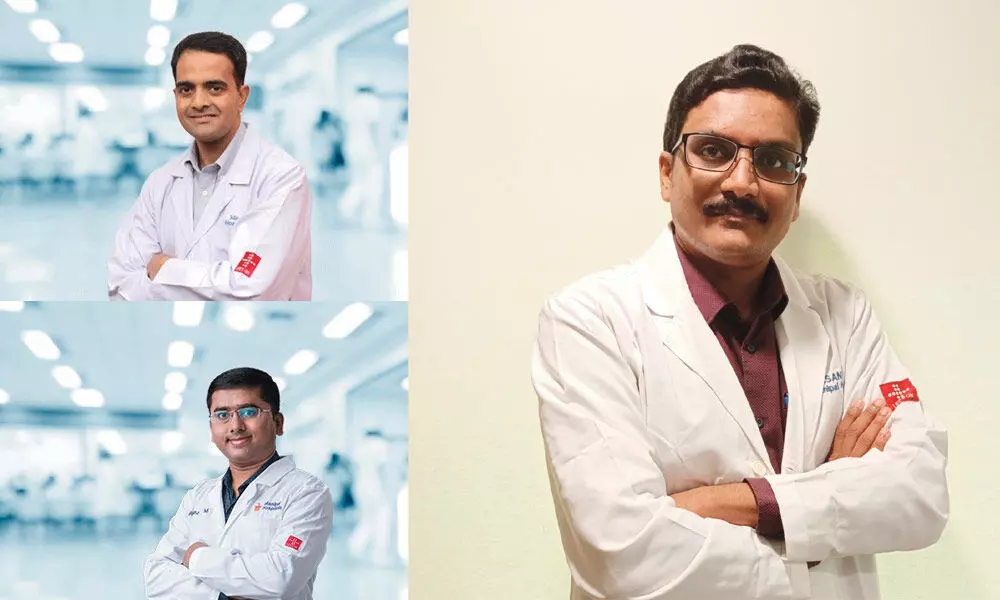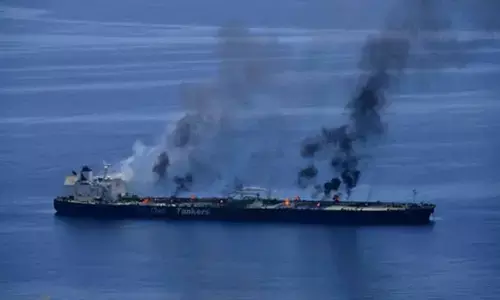Covid-19 has pushed up stroke death rate: Doctors

Dr. Paritosh, Dr. Manjunath and Dr. N S Santhosh
The dreaded coronavirus has pushed many lives to the edge of death so has those of stroke patients
The dreaded coronavirus has pushed many lives to the edge of death so has those of stroke patients. The death rate caused by stroke in India -- 73 per 100,000 persons every year – has been pushed up by the Covid-19 pandemic.
Dr N. S. Santhosh, Consultant - Neurology at Manipal Hospitals, Whitefield said, "The Covid-19 predominantly causes the ischemic stroke, where there is occlusion of the blood vessel due to the increased coagulability of the blood .Rarely the blood vessel in the brain can rupture as well causing the hemorrhagic stroke. Many reports have documented an increased thrombosis/occlusion of the blood vessel can occur Covid-19 due to the coagulation abnormalities like elevated D-dimer and fibrinogen in the blood."
Dr Manjunath Mahadevappa, Consultant – Neurology, Movement Disorders, Manipal Hospitals, Old Airport Road also pointed out that Covid-19 is known to cause stroke, and this has been documented in multiple studies worldwide.
"Three main mechanisms: Hypercoagulable states, Vasculitis and cardiomyopathy are postulated to be responsible for ischemic strokes and involvement of endothelial and arterial smooth muscle in hemorrhagic strokes. These strokes can be occasionally severe and rarely fatal," he said.
Talking to The Hans India, Dr Paritosh Pandey, Consultant - Neurosurgery, Stroke Specialist and Dr. Ullas V Acharya, Consultant – Neuroradiology, Radiology, Manipal Hospitals Old Airport Road shared the case of a young stroke and covid 19 infected patient who was treated successfully at Manipal Hospitals. "Though stroke is usually a disease of elderly, the recent coronavirus (Covid-19) global pandemic is seen associated with an increased incidence of acute ischemic stroke (AIS) secondary to large vessel occlusion (LVO) even in relatively younger individuals. The treatment of these patients poses unique and significant challenges to health care providers requiring changes in existing protocols," Dr Pandey said.
"A 44 year old lady with no other comorbidities presented to our emergency department on July 26 early morning hours with complaints of dry cough since 2 days and sudden onset of weakness on right side and difficulty in speaking since 7:30pm on July 25 (approximately 9 hours after stroke symptoms onset) (National Institutes of Health Stroke Scale, NIHSS around 14). She was initially taken to a local hospital where CT brain failed to detect any acute abnormalities. On arrival at Manipal Hospitals emergency department, along with the paralysis on the right side, she was found to be drowsy, not vocalising and disoriented. She was admitted via an isolated room specifically designed for patients with symptoms suspicious or confirmed for Covid-19," he explained.
Post intubation by emergency team with universal precautions to minimize in hospital droplet spread, MR imaging and angiography studies were done, which were analysed by Dr Acharya, showed occlusion (blockage) of main arteries (internal carotid artery and middle cerebral artery) supplying the left side of the brain. Meanwhile her covid antigen test returned positive and further swab reported was collected.
Due to time delay at arrival from symptom onset to presentation to the emergency department, the patient was excluded to receive intravenous tissue plasminogen activator according to current guidelines.
She then underwent an angiogram followed by mechanical thrombectomy for left internal carotid artery (ICA) occlusion under general anaesthesia following a new protocol specifically designed to maximize protective measures for the team involved in the care of the patient. The neuroendovascular team prepared the patient for the procedure, under a predetermined special personal protective equipment (PPE) protocol for the care of Covid-19 patients which included gown, gloves, visor, mask, surgical hoods, boots and scrubs. The door to reperfusion time was around 60 min and groin-to-reperfusion time was around 25 min.
"Post procedure, she was transferred to the Medical ICU, Isolation zone for further management. Post procedure, the patient was transferred to MICU with Endotracheal Tube (ET tube) in situ. The patient's hemiparesis improved the day after the procedure and weakness recovered almost completely at the time of discharge. The Infectious disease team managed the Covid infection in isolation. She was discharged around a week after the stroke, and at 2 months post procedure, she is neurologically normal, without any deficits," Dr Pandey explained. Talking about the age group in which incidence of stroke is majorly found, Dr Mahadevappa said, "While the incidence of stroke in non Covid-19 positive patients typically increases with older age, data support an association between Covid-19 and stroke in younger population without typical vascular risk factors."
"These patients sometimes only have mild respiratory symptoms. A multicentre study published in Lancet Neurology reported that over 27% of strokes were in patients aged younger than 50, and 2 out of 15 patients with large vessel stroke were younger than 50 and without previous risk factors. Patients with Covid-19 fare worse in terms of clinical outcomes probably in part due to Covid-19 disease process as described previously," he stated.
Dr Santhosh stated that early diagnosis and treatment is the key for success. "Any patient with the loss of taste and smell with fever should visit hospital and get evaluated and treated for Covid-19. The elevated CRP and IL-6 levels are indicators of the severe inflammatory response while elevated d-dimer levels indicate activation of the coagulation factors. Hence if admitted in hospital, they can be monitored for the D dimer levels and advise blood thinning medications as per need for these patients , which can prevent ischemic strokes . Any patient with a stroke presenting within 4.5 hours if it is ischemic can be treated with the IV thrombolysis, which will definitely improve the outcome of the patient," he explained.








